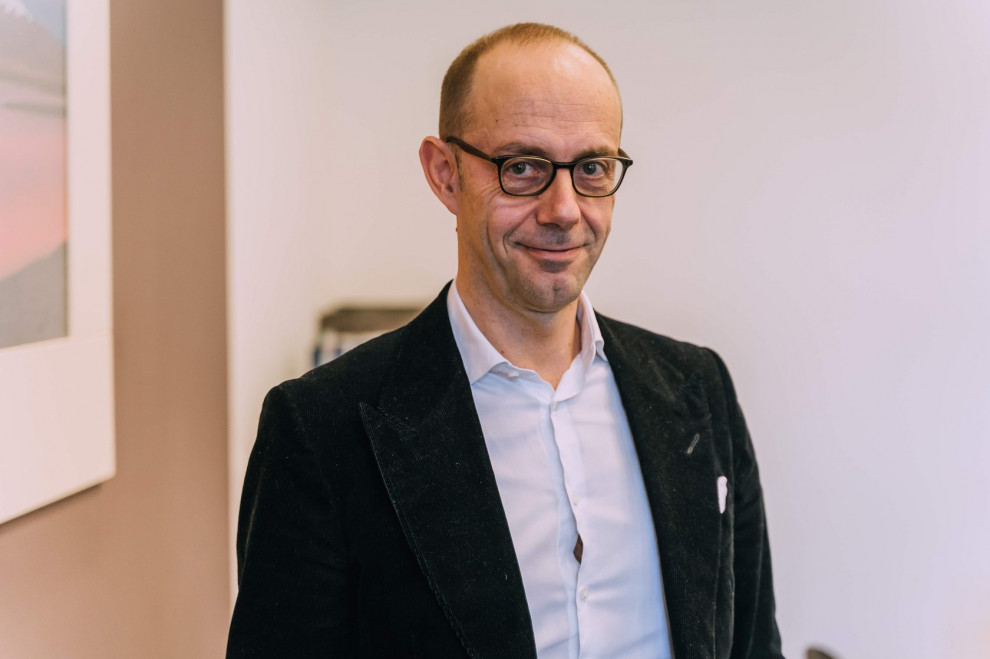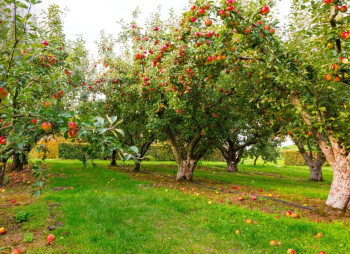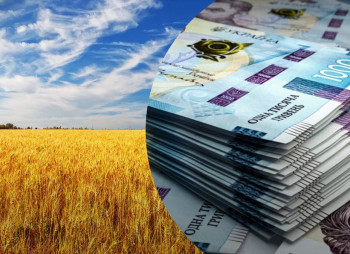Land, the privatization of large facilities, transport infrastructure and the country as a whole is a “sweet spot” in the global world for major international investments. In part, they capitalize the country on a number of investment projects or take it away from default in separate cases, as was the case with the Mriya agricultural holding, which was bought by Arab capital. But in general, the effect of foreign investment is still not realized nationwide. How to safely run it in full?
Let's start with question number 1 on the agenda - land reform. How do you rate its implementation?
Land reform is the most important reform for Ukraine, laying a powerful factor in economic growth for a long time. Land is an asset. And the axiom is applied to it: if there is an asset that you can sell and buy, then it automatically rises in value. And vice versa: the value of an asset is reduced if it cannot be sold or bought. This affects those who have land and use it. If the agricultural companies own land, then its value will increase significantly. A transparent land reform can significantly capitalize Ukraine in general and agricultural companies in particular. Land owners will be able to sell land and spend raised funds on another business, that is, the middle class is developing.
Your assessment: what kind of capitalization are we talking about?
Capitalization will be brought primarily by the free and open market without restrictions on capital for the purchase of land. Land and agricultural business in Ukraine are a large part of the economy, growing at the fastest pace. But if you compare it with the productivity of the agricultural sector in Western Europe, then you have it is very low. The reason is the lack of domestic capital for the development of agricultural business (technical improvement, introducing irrigation, high-quality fertilizers, and so on). Unfortunately, Ukraine is still a poor country - it needs foreign capital to finance a number of projects and not only in the agricultural sector. How to attract it? One of the best options is transparent land reform. Land is an entrance ticket for Ukraine to the club of attracting large global investments.
In your interview, speaking about President Volodymyr Zelensky and land reform, you said: “if you really want to change the country and implement real reforms, then, as a result, there will be protests, but you should not be afraid of them”. We have already seen protests. What do you advise the President and the government? What could be a compromise on the issue of land?
For me, President Zelensky is the leader of a country with Western-oriented thinking and with a high rating, he is supported by Ukrainians. Now he has a majority in the Rada. Yes, the rating is a little less than it was a month ago, but it is justified: he does not hide, but solves complex internal problems, including those at the geopolitical level, which he inherited. It is always difficult and causes a lot of criticism and populism around, as well as protests. Protests are an integral part of the right changes that break the old order and system.
Zelensky has a unique opportunity to reform the country. If he wants to make real reforms, then he should not look at the short-term rating. As president-reformer, he should be concerned about the strategic development of Ukraine. If Zelensky and the government carry out land reform, then the rating will not be important in 2 years, because the economy will receive a completely different quality incentive for strategic development.
Correct market regulation and maintaining equal transparent rules of “the game” for the entire agribusiness will help to prevent speculation on the land theme.
Do you have a feeling that we are on the cusp of a "land Maidan"?
I see no reason for this. People will not do it themselves. It can be provoked by political manipulations of public opinion to destabilize the country. The theme of the land is now well suited for such manipulations. And tomorrow there may be other topics.
Is a land reform really a problem? All modern western countries carried out it. Ukraine follows their example. The problem is not in the land and reform, but in the fact that there are those who want to get into power. There are always plenty of them, and the methods for this are different.
Correct market regulation and maintaining equal transparent rules of “the game” for the entire agribusiness will help to prevent speculation on the land theme. Also, it is better not to limit capital when buying and selling.
The admission of foreigners to the market and the restriction on the purchase of land for one person are two of the most controversial topics on the way to the market. The issue of foreigners will be resolved in a referendum, as President Zelensky said. What will be the reaction of international business already operating in Ukraine?
I do not believe that an all-Ukrainian referendum will solve the problem of allowing foreigners to enter the land purchase and sale market. Land reform is a comprehensive reform. Today, a lot of emotions have been thrown into society, and no real arguments can be seen behind it.
As for the reaction of investors with foreign capital already operating in Ukraine, they will simply freeze investments in the agricultural sector. My clients previously planned to invest, but now they don’t understand what is happening and how it will end. Therefore, all investment plans were suspended.
Will there be an outflow of foreign capital from the agro-industrial complex in connection with the ban on buying land for foreigners?
I do not exclude this. If some participants can buy on the market, but not others, this is unfair competition. At a minimum, this will entail a reduction in investment, and at the very least, withdrawal from the country.
How much can foreign investments come to Ukraine if foreigners are allowed to enter the market?
Unlimited land reform for foreigners is $ 10 billion over the first 5 years. On average, it is about $ 2 billion a year. A closed market is minus $ 2 billion of potential investments.
You are talking about foreigners. But there is another side. Land reform is not underway, because farmers and the middle class do not have money to buy land, and there are no loans available either. What compromise do you see in this case, and is there any?
I perfectly well understand your arguments and agree with them. A compromise is possible. State-owned banks should probably offer an affordable package of services (not only loans) for small and medium-sized agricultural producers. International institutions can help with the financing of such programs.
Today, land and market are emotionally, psychologically and politically challenging issues. It must be solved gradually. On one hand, to give a resource for the purchase of land to small and medium-sized businesses. On the other hand, to allow already operating companies with foreign capital to buy back the land they cultivate in Ukraine. As a whole, companies with foreign capital, as well as Ukrainian public companies (part of the shares are sold on exchanges) process 5% of all agricultural land in Ukraine.
These may be compromise steps at the first stage of land reform. Then, it will be seen, whether or not the existing risks in the society associated with land reform will be justified. I think not.
How will the ban on buying land affect public agricultural holdings?
The ban on buying agricultural land by foreigners and companies that have a share of foreign capital is a form of uncertainty. International lenders do not want to bear additional risks, and the value of shares (and therefore the company) is reduced or underestimated.
There is one more disadvantage: the ban on buying land by foreign companies is the way for various schemes to appear on the market. You cannot forbid capital to move. It will search for any way to bypass the ban within the framework of the existing law. If this is done within the framework of uniform permanent land standards - this is one thing, without them - completely different. This is unlikely to add transparency to the land market structure.
You mentioned loans for small and medium participants. Is this a hint of a separate land bank in Ukraine?
I do not think that a new separate state land bank is needed. We need a special product for the purchase of agricultural land on the basis of existing state banks (Privat, Oschad, Ukrexim).
And how do you feel about land bonds for state lands - will it be an effective and sought-after mechanism?
Theoretically, yes. Today, interest rates on external government loans are very attractive for Ukraine - 6%.
Are land state bonds at 5-6% real? For example, to create a second-level mortgage institution, where Ukraine and the international top twenty banks can join partners with the state (Morgan Stanley as an option). From the Ukrainian side, for example, to contribute 1 million hectares of state land, and from the bank side - cash capital, depending on the average price of agricultural land. Then bonds are issued, and the money raised is used to finance loans in the agricultural sector (including the purchase of land) for small and medium-sized businesses.
This can be done theoretically. But here it is important who will earn on this charter land, what are the conditions for the return of bonds, whether there will be extra charges and so on. In Hungary, such a mechanism has been used successfully, in Poland too. Land is a huge opportunity for Ukraine. This is your trump card, you just need to play it right.
If we stop on the ban for foreigners, will their interest of realization through leasing be deferred or will it go to other countries?
They are already working on lease. Of course they will lease. Now they are leasing.
If the land law says that the purchase of land for one person is not more than 10 thousand hectares and prohibit access to foreigners, can we expect the emergence of land trusts? To collect land for a specific law firm.
Yes it is possible. In Ukraine, there is hardly a structure for trusts. This is Anglo-Saxon law.
But in September, the parliament passed a draft bill on trust. It is a kind of trust. That is, from January 1, the market will work. Banks and agricultural companies will be able to lend to land owners secured on land. Frankly speaking, they will not have the right to buy land, but no one forbids them to sell! This is the actual market - whether or not the land law will be adopted.
Yes, it can be as one of the options for the existence of the land market in case of restriction of the rights of law firms. It's like in Britain there is a 99-year lease, and the queen remains the owner. In the case of trust management, the owner of the land may be a Ukrainian, but anyone can be a long-term tenant.
Privatization of Odesa Portside Plant (OPP) PJSC
Question number 2 - privatization. The government promises to launch it in 2020. A number of large state enterprises will be put up for sale. Is it worth it, since our war is not over, the value of assets is underestimated. In addition - the global crisis is ahead.
This is a good time to sell. It was impossible 4 years ago. The war slowed down this process. Now investors do not think that war has a destabilizing effect. They believe that the situation in this regard will improve or remain at this level. In addition, the situation in global markets is good. What will happen in 3 years - I do not know. It’s time to sell.
Let's talk about agricultural privatization. Is foreign business interested in such an object as an Odesa Portside Plant (OPP) PJSC? Which country investors can buy it? Will it be able to compete with Kolomoisky?
This asset is very interesting and many people like it. They tried to sell it eight times, and it didn’t work out that way. It is difficult to privatize for two reasons. The first is the price of gas. Gas is the basis of the feedstock produced by OPP. Buying it is beneficial only to those who have cheap gas ($ 105-107, $ 180 - this is already unprofitable) and its systematic continuous supply.
The second one is a big debt to Group DF. This is a risk, and the situation is not easy.
These two issues must be resolved, and then it can be sold. Privatization of OPP is a political issue. Many will be able to come to the competition for its purchase: investment funds or a consortium, but only if the issue of gas and debt is resolved.
Did you offer your services to the government in privatizing this facility?
You know that now there is an adviser on OPP issue appointed by the previous government. Although I know a lot of potential investors from the USA, EU, Central Asia who are interested in it. Two years ago I even made an offer to the Cabinet of Ministers of Ukraine on the privatization of OPP. Now it is not clear what they want to do.
Maybe they’ll just sell it to Kolomoisky. It is alleged that Ukrtranskhimamiak (the “pipe” to OPP) is already owned by him.
I do not know.
State Food and Grain Corporation of Ukraine (SFGCU): the first thing to do is to restructure Chinese debt
You were engaged in the restructuring of many companies with troubled loans. What do you advise the Cabinet to do with SFGCU: to privatize, but first restructure the Chinese loan or to give it to the Chinese for debts?
Such a problem exists. The first thing to do is to restructure the Chinese debt. I have been living in China for 1.5 years and I know them well. Restructuring the debt of SFGCU with China is possible, given a will. China has a strategic interest in Ukraine, it is possible to negotiate with them for a good restructuring period.
That is, not corporatization, but debt restructuring for privatization?
What do you mean by corporatization?
Transfer of 49% of the company shares to the Chinese side and choose a second line of credit in the amount of $ 1.5 billion.
I think that there is a problem of debt, and we should start with it, and then privatization. If not, privatization will be non-market privatization.
How much will China influence Ukraine and its expansion in the agricultural market?
This is not a super priority, but they really want to balance their interests in Russia and Ukraine. They are very interested in the Russian Federation. Relations between China and the Russian Federation have never been so good as they are now. Accordingly, it is unlikely that to be talking about billions of investments from China to Ukraine in the near future.
And if you look at the map of investors in the world, where is the greatest interest in Ukraine?
I had the process of selling the agribusiness of two companies. Which ones - I cannot tell. But all the investors slow down, they do not understand what is happening in the country: IT, chemical factories, Motor Sich, Turboatom, energy market, green tariffs, pharmacists, real estate...
Most of the interest on the part of investors is in the agricultural sector, but incomplete land reform slows down the whole process.
Which investing countries are most interested in Ukraine?
Investors from China, Turkey, Europe, a lot of English funds and financial (non-industrial) American investors.
“Mriya” is a “portal” of entry into Ukraine for Arab business
More than a year has passed since the sale of Mriya. Do you consider this case successful for an investor, a country?
Yes, super successful. There were no default and a shock of the agricultural sector and Ukraine. The company continued to work in a new form, people saved jobs.
Let me remind you that when we started working on saving the company, an audit of the assets showed that Mriya really cost $ 200-250 million, debts were $ 1.2 billion! In other words, investors lost 80% of the money invested due to unscrupulousness of the former owners of Mriya. We did a fantastic job of restructuring the company's debt, converting it into new securities and transferring it to the management of a new Arab investor.
There is an opinion on the market that investors overpaid for an agricultural holding. Why do you think SALIC bought the company?
Mriya is a successful strategic acquisition for the Arabs. Perhaps the financial situation in the company was not the easiest, but the purchase of Mriya is the “portal” of entry into Ukraine for Arab business. This is a strategic platform for the development of Arab business in the region. Initially, SALIC planned to invest $ 500 million over 3-4 years, but due to a land reform delay, these plans are tied-up. They will not leave, although they are not very happy about the situation with the prohibition for foreigners to buy land. This is a big drawback.
Are you worried by the fact that Mykola Guta is free? The prosecutor's office did not find his fault in the manipulation of Mriya's reporting.
What can I tell you: it's just a scandal.
Is it all?
I have nothing more to add. I am not the prosecutor general or law enforcement. I am an investment banker. This is bad. When investors see that no one is responsible for such alleged fraud - this, of course, is a bad signal for the rest. This is a disreputableness of the law enforcement system. Thanks God this is not always the case, but even isolated cases are alarming.
Ukraine should not be a country behind the looking glass, and the investor should not feel like Alice. For 28 years, investors have already built up a tolerance to troubles in Ukraine. They learn to understand the country's internal risks.
Are your clients interested in agricultural assets in Ukraine? What exactly: land, ports, grain elevators?
Yes. Ports are not very. A lot of infrastructure is being built, so the demand is satisfied. Land is always interesting: there is a group of investors (pension funds) in Europe who are ready to buy land in Ukraine and rent it for 7-8% per annum. Under this project I can get $ 200-300 million. They are also interested in agricultural products, because the quality is good.
Are they ready to buy specific agricultural companies?
Yes, this year I was negotiating two such transactions (I can’t name the companies). But the uncertainty in land reform is slowing down the purchase. They do not understand what to expect later.
About the future of Ukrlandfarming
You represent the interests of international lenders in the Ukrlandfarming debt case. Is it possible to solve this problem and how?
Who will buy it? There is a very complicated situation. There are state interests, international lenders. No one will buy these assets yet.
The problem with the company's debts needs to be resolved. How?
I can’t say it yet, we’re dealing with this issue. There 30 thousand people working, a huge land bank, more than 1 million tons of product exports.
Source: latifundist






